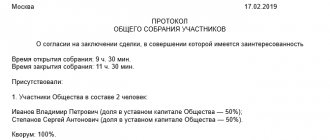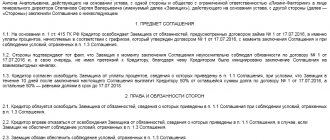What is interdependence
The essence of interdependence is in special relationships between individuals, in which some can influence the conditions and results of the activities of others. This is established in Article 105.1 of the Tax Code. An immediate sign of the existence of a connection between persons is the participation of one of them in the capital of the other. For example, company A is the founder of company B. Another classic example is an individual and the LLC of which he is a member. These are the simplest cases.
But interdependencies can be more complex. The law states that persons are recognized as dependent if one of them can influence the decisions made by the other. Such influence may be due not only to financial dependence, but also to others, for example, family ties or official position.
Cases when persons are recognized as dependent or controlled are listed in paragraph 2 of Article 105.1 of the Tax Code of the Russian Federation. But paragraph 7 of the same article makes a reservation - the court may recognize other grounds for establishing the fact of mutual dependence. So if the court sees a connection of a different kind, for example, friendly relations between the directors of two companies, they can also be recognized as interdependent.
Are transactions between dependent parties permissible?
The law cannot prohibit two companies from conducting a transaction just because their managers are, for example, relatives. Moreover, the principle of due diligence forces us to carefully check our counterparties and not work with just anyone. In this regard, choosing a supplier headed by a well-known and trusted person seems quite logical. However, this is true only if the requirement of paragraph 1 of Article 105.3 of the Tax Code of the Russian Federation is met: special conditions cannot be established in such a transaction. In other words, you need to enter into an agreement with a dependent organization on the same terms on which it would be concluded with a completely “unfamiliar” company.
The terms of the transaction in this case mean not only the price, but also all others. For example, giving preference to your buyer in the form of free shipping and/or insurance may be considered a special condition of the transaction. Of course, in the event that the company does not indulge its other clients with such attention. The same can be said about granting a dependent organization a deferred payment. In general, any conditions for working with organizations or individual entrepreneurs that are in one way or another dependent or controlled must be absolutely market-based.
If you adhere to the above principle, then you can carry out transactions with dependent parties. Of course, provided that both parties to the transaction are bona fide taxpayers and regularly fulfill their duties. Then the tax inspectorate will have no reason to find fault with the operation.
Controlled transactions
The legislation includes the concept of “controlled transactions”; they are listed in Article 105.14 of the Tax Code of the Russian Federation. And Article 105.16 of the Code states that the tax service must be notified of such transactions. However, will any transaction between related parties be considered controlled? Not at all. Transactions that affect the tax base for taxes on corporate profits, mineral extraction, personal income tax of citizens with individual entrepreneur status, as well as VAT may be considered controlled. Moreover, with regard to the latter tax, the following condition is specified: one of the parties to the transaction is not its payer or applies an exemption from its payment. These are the requirements of paragraph 11 of Article 105.14 and paragraph 13 of Article 105.3 of the Tax Code of the Russian Federation.
In general, if we talk about relationships with Russian dependent parties, then most transactions with them will not be classified as controlled. But this does not mean at all that they will fall out of the field of view of the Federal Tax Service.
Loan agreements between related parties
Loan agreements between related parties, as a rule, are concluded without interest or at a symbolic interest, since the purpose of such borrowing is to replenish the lack of working capital from the related party. Accordingly, taxpayers have questions about the controllability of such transactions. Here is what the Ministry of Finance thinks about this.
How to determine total income under loan agreements
In letters dated 08/28/2012 No. 03-01-18/6-114 and No. 03-01-18/6-111, dated 07/05/2012 No. 03-1-18/5-92, Ministry of Finance officials argue as follows:
1) Article 105.14 of the Tax Code of the Russian Federation establishes the conditions for recognizing transactions as controlled. In this case, the transactions provided for in paragraphs. 2 and 3 paragraph 1, paragraphs. 1 - 5 clause 2 of this article are considered controlled if the amount of income from such transactions in a calendar year exceeds the value of the corresponding amount criterion;
2) according to clause 9 of Art. 105.14 of the Tax Code of the Russian Federation for the purposes of this article, the amount of income from transactions for a calendar year is determined by adding the amounts of income received from such transactions with one person (interdependent persons) for the calendar year, taking into account the procedure for recognizing income established by Chapter. 25 Code .
And then the taxpayer is asked to draw a conclusion on his own. The conclusion, apparently, is this: income for the purposes of Chapter 25 includes income from the sale of goods (work, services), property rights and non-operating income (clause 1 of Article 248 of the Tax Code of the Russian Federation). Non-operating income, in particular, includes income in the form of interest received under loan agreements (clause 6 of Article 250 of the Tax Code of the Russian Federation). At the same time, when determining the tax base, income in the form of funds or other property received under loan agreements, as well as in repayment of borrowings (clause 10, clause 1, article 251 of the Tax Code of the Russian Federation) is not taken into account. Thus, when calculating the amount of total income for a calendar year on transactions with one person (interdependent persons in the “chain”) under loan agreements, only interest is taken into account.
The Ministry of Finance spoke more definitely in letter dated May 23, 2012 No. 03-01-18/4-67: when determining for the purposes of Art. 105.14 “Controlled transactions”, the amount of income from transactions for a calendar year takes into account income in the form of interest received under the loan agreement. In this case, income in the form of funds or other property received under a loan agreement, as well as funds or property received to repay such borrowings, are not taken into account when calculating the specified amount.
Market interest rate
If, nevertheless, loan agreements between interdependent persons, together with other transactions, fall under controlled transactions, then, as follows from the above-mentioned letters from the Ministry of Finance of the Russian Federation, a comparison of the commercial (financial) terms of such transactions and their results with the commercial (financial) terms of transactions between independent persons will be carried out on the basis of section V.1 of the Tax Code of the Russian Federation. Accordingly, interest on debt obligations between related parties for tax purposes must be calculated based on market prices determined in accordance with Art. 105.3 Tax Code of the Russian Federation.
At the same time, not only income will be controlled, but also expenses in the form of interest on debt obligations of any type.
Consequences
So, controlled and “ordinary” transactions, that is, those that are not such, can be concluded between interdependent persons. And they will be checked differently.
The transaction is controlled
If the tax inspectorate finds out that the company conducted a controlled transaction without appropriate notification, this fact will be reported to the central office of the Federal Tax Service. The fact is that the territorial Federal Tax Service itself does not have the authority to verify the correctness of tax calculations during controlled transactions - this is the area of responsibility of the Federal Service.
Having received information from the territorial authority, the Federal Tax Service will check the transaction regarding the correctness of the calculation of the taxes mentioned above. As a result, a decision may be made to adjust the transaction price, which will lead to an increase in the tax base and additional taxes to one of the parties to the transaction.
But there is one circumstance that is unlikely to allow such additional accruals to be put on stream. The fact is that, in accordance with Article 105.18 of the Tax Code of the Russian Federation, the second party can also apply the “new” price of the Federal Tax Service for tax purposes. As a result of this adjustment, its tax base will most likely decrease: if the price is higher, then the costs will be higher. It turns out that this party paid “extra” tax, which should be refunded or deducted. So it doesn’t always make sense to make additional charges on controlled transactions.
Other transactions
Transactions between interdependent persons that are not classified as controlled are included in the inspection area of the Federal Tax Service. At the slightest deviation from market conditions, inspectors will look for a motive. More precisely, they will assume that there is a motive - it is receiving an unjustified tax benefit, and will search for evidence of this.
An unjustified tax benefit is considered to be an understatement of the tax base, unlawful application of benefits, deductions or reimbursements. In general, everything that in one way or another led to a reduction in the tax obligations of a company or individual entrepreneur. When assessing transactions, inspectors take into account the existence of a purpose and reasonable justification for the transaction, and its compliance with business customs. Particular attention is paid to establishing the reality of the operation. After all, if it was carried out only on paper, this is an “iron” reason to recognize the tax benefit as unjustified.
An understatement of the tax base can be seen even in such a common business lending mechanism, when the founder gives the company an interest-free loan. After all, if an organization applied for a loan from a bank, it would have to pay interest. Therefore, there are special terms of the transaction between dependent parties - the company and its founder. And theoretically, the latter may be charged additional personal income tax in the amount of the interest he has not received on the loan. Especially if his organization applies a special taxation regime that does not take into account actual revenue, for example, the simplified tax system with the object “income”. In this case, the amount of income not received by the founder will be calculated based on the interest at which comparable loans are issued.
Today, additional assessments and fines due to unjustified tax benefits, including as a result of transactions with affiliated companies, are common practice. So in this regard, transactions that do not fall under the definition of controlled ones can be called even more “promising”. Thus, whatever the essence of the transaction with a dependent person, if its conditions do not correspond to market ones, it may attract the attention of the Federal Tax Service.
Is paying interest on a loan to a related party a controlled transaction?
The Judicial Collegium for Economic Disputes of the Supreme Court of the Russian Federation undertook to consider the issue of standardization for profit tax purposes of expenses in the form of interest on a debt obligation to a related party, as well as whether such debt can be considered controlled.
Interdependence and controlled transactions
For tax purposes, interdependence arises if the characteristics of the relationship between counterparties are such that they may affect:
- the terms of the transactions they make;
- the results of their transactions;
- economic results of the activities of these persons or the activities of the persons they represent.
One form of interdependence is the direct or indirect ownership by one organization of more than 25 percent equity interest in another firm. By virtue of such participation, an organization that owns a significant stake in another firm has the opportunity to influence or even determine its decisions.
From a taxation point of view, interdependence makes it possible to minimize the taxable base, including through concluding transactions not on market conditions. Therefore, the Tax Code of the Russian Federation provides for the inclusion in the tax base of income that was not received, but could have been received by one of the interdependent parties to the transaction if the transaction had been concluded on market conditions.
The Federal Tax Service of Russia is authorized to assess the amount of such “hidden” income and adjust the taxable base for corporate income tax. The Tax Code of the Russian Federation provides for special methods of tax control in relation to agreements between interdependent persons. In this case, the company has the right to voluntarily declare its taxable income not received due to the special conditions of the transaction with an interdependent counterparty. Then there will be nothing to fine her for.
It is no coincidence that civil law agreements between interdependent persons, including loan agreements, are classified as controlled transactions for tax purposes - under certain conditions established by Art. 105.14 Tax Code of the Russian Federation. For the purposes of classifying a transaction between related parties as controlled, the following matters:
- place of registration, residence, tax residence of the parties to the transaction and beneficiaries;
- the amount of income from the transaction for the calendar year.
Controlled debt
The concept of controlled debt is used for tax purposes of corporate profits in relation to interest-bearing debt obligations in the presence of interdependence of counterparties. Controlled debt is considered to be:
- a debt obligation of a Russian organization, including a loan, to an interdependent foreign creditor who has a stake in the debtor’s capital;
- a debt obligation to a creditor in which a foreign person substantially participates.
If there is controlled debt, including loans, it is important for the Federal Tax Service of Russia to correctly determine the tax base of the debtor, taking into account the likelihood of receiving a loan or other debt at non-market interest. Therefore, non-operating expenses in the form of interest on controlled debt are normalized for profit tax purposes - if the amount of controlled debt is more than 3 times the difference between the amount of assets and the amount of liabilities of the debtor. How to determine the maximum interest rate on controlled debt is stated in paragraphs 4 - 6 of Art. 269 of the Tax Code of the Russian Federation.
What is the essence of the dispute
During an on-site tax audit, the Interdistrict Inspectorate of the Federal Tax Service No. 25 for the Sverdlovsk Region found that the debtor organization did not normalize for profit tax purposes expenses in the form of interest on loans to a creditor that is interdependent with a foreign company that has more than 90% indirect ownership in debtor's capital.
The tax inspectorate qualified the organization's debt on such loans as controlled, and exceeding the amount of its own capital by more than 3 times. Therefore, the organization was charged with a tax offense - overestimating the amount of expenses in the form of interest, which should have been normalized rather than recognized in the actual amount. According to the inspectorate, as a result of including interest in expenses in full, the organization underestimated the taxable base for income tax.
On this basis, the tax inspectorate assessed additional income tax to the organization, imposed penalties and fined it under clause 1 of Art. 122 of the Tax Code of the Russian Federation. After which the organization complained to the Office of the Federal Tax Service of Russia for the Sverdlovsk Region, but the inspector’s decision was left unchanged.
Then the organization appealed to the Arbitration Court of the Sverdlovsk Region, citing the fact that its loan debt to the creditor is not controllable, and the interest accrued on loans is subject to taxation without applying Art. 269 of the Tax Code of the Russian Federation, that is, without standardization.
Arbitration Court of the Sverdlovsk Region
By decision of 08.26.2019 in case No. A60-29234/2019, the court refused to satisfy the organization’s demands on the grounds that the additional assessment of income tax was carried out by the inspectorate lawfully. The court qualified the loan debt as controlled, the interest on which is subject to normalization for the purposes of inclusion in non-operating expenses. After this, the organization filed an appeal with the Seventeenth Arbitration Court of Appeal.
Seventeenth Arbitration Court of Appeal
In the resolution dated November 22, 2019 No. 17AP-9456/2019-AK in case No. A60-29234/2019, the court referred to the legal position of the Presidium of the Supreme Arbitration Court of the Russian Federation from the resolution dated November 15, 2011 No. 8654/11, according to which not only debt to a foreign company, but also debt to a Russian creditor affiliated with a foreign company. On this basis, the court dismissed the organization's appeal without satisfaction. And the next stage of the proceedings took place in the Arbitration Court of the Ural District.
Arbitration Court of the Ural District
By Resolution No. F09-9876/19 dated 02/11/2020 in case No. A60-29234/2019, the organization’s cassation appeal was left unsatisfied, after which the organization appealed to the Supreme Court of the Russian Federation.
Supreme Court of the Russian Federation
By the commented ruling, the Supreme Court of the Russian Federation referred the organization’s complaint for consideration at a court hearing of the Judicial Collegium for Economic Disputes. The court drew attention to the fact that the foreign company did not control the loans received by the organization and could not influence the terms of their provision. In this case, borrowed funds were used for investments exclusively in Russia, and the lender paid income tax on the full amount of interest received.









